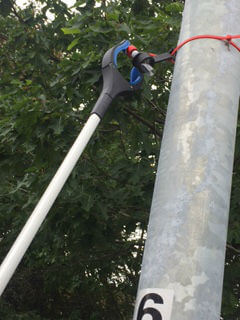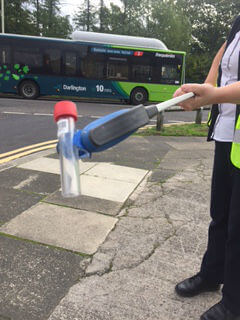Air pollution and air quality
- Air quality monitoring
- Care for clean air
- Industrial air pollution control
- Smoke control areas
- Garden bonfires
Air quality monitoring
We are responsible for monitoring and safeguarding air quality. We regulate emissions from certain industrial processes and investigate complaints about air pollution.
We measure nitrogen dioxide levels at sites around Darlington.


Legal air quality reviews
Councils must produce periodic reviews and assessments of local air quality.
Air pollution is compared with standards and objectives set out in the National Air Quality Strategy.
If these objectives are not met then an 'Air Quality Management Area' (AQMA) must be declared. We would prepare an action plan setting out how we will improve in specified timescales.
There are no declared AQMAs in the Darlington area at this time.
- 2024 Air Quality Annual Status Report [pdf document]
- 2023 Air Quality Annual Status Report [pdf document]
- 2022 Air Quality Annual Status Report [pdf document]
- 2021 Air Quality Annual Status Report [pdf document]
- 2020 Air Quality Annual Status Report [pdf document]
- 2019 Air Quality Annual Status Report [pdf document]
- 2018 Air Quality Annual Status Report [pdf document]
- 2017 Air Quality Annual Status Report [pdf document]
- 2016 Air Quality Annual Status Report [pdf document]
- Annual Report 2016 - Air Quality in Tees Valley 2012 2015 [pdf document, 2.5mb]
- 2015 Air Quality Updating and Screening Assessment for Darlington Borough Council [pdf document]
UK Air
Further information and air pollution data can be found on Defra's UK Air website [external link]
Care for clean air
In January/February 2023 Environmental Health launched the Care for clean air campaign.
The campaign encourages motorists to turn off their engine while their vehicle is stationary.
We are especially focused on drivers who leave their engine idling while waiting for youngsters to finish school and the team have provided schools with information to share with parents/carers.
We are also using social media and marketing to help raise awareness of this important issue in the hope the campaign will encourage parents to switch off their engines.
This will help to prevent air pollution and protect our health.
Care for clean air [pdf document]
Industrial air pollution control
We work with local industry to control emissions. The Environmental Permitting (England and Wales) Regulations 2016 list industrial processes that must get a 'permit' before they can legally operate.
These processes are based on the likely environmental impact:
- Part A1 installations in Darlington are regulated by the Environment Agency for emissions to air, land and water. Enquiries relating to Part A1 installations should be directed to the Environment Agency on 08708 506506. Information is available on the Environmental Management pages of Gov.uk [external link]
- Part A2 installations are regulated by the council for emissions to air, land and water ('LA - IPPC' Local Authority Integrated Pollution Control) - there are no such installations in Darlington at present
- Part B installations in Darlington [pdf document] are regulated by the Council for emissions to air only ('LAPPC' Local Air Pollution Prevention and Control)
Enquiries in relation to applications for Part A2 or Part B applications and requests to access the public register should be directed to [email protected].
To apply for a permit for a new Part B installation or to amend an existing permit, the relevant forms can be downloaded, below:
- PPC1 Part B application form [pdf document]
- PPC1A Part B application form for dry cleaners [pdf document]
- PPC1B Part B application form for the respraying of road vehicles [pdf document]
- PPC1C Part B application for a permit for service station [pdf document]
- PPC1D Part B application form for cement batching [pdf document]
- PPC1E Part B application form for mobile crushing and screening plant [pdf document]
- PPC1F Part B application form for powdered coating, sherardizing or enamelling [pdf document]
- PPC2 variation application form [pdf document]
- PPC3 transfer application form [pdf document]
- PPC4 surrender form [pdf document]
- PPC5 declaration of reduced operation [pdf document]
For information on Part B Processes and fees payable visit Defra's website [external website].
Smoke control areas
When using your wood burning stove make sure you stay safe, within the law and help prevent air pollution and harmful health impacts by following a few simple rules.
Most of Darlington is in a smoke control area. You must only burn authorised fuels, which include smokeless fuels such as anthracite.
If you have an ‘exempt appliance’ then you should burn fuels compliant with your appliance.
Our smoke control areas information sheet [pdf document] contains more information.
For information on authorised fuels and exempt appliances see The Smoke Control Areas website [external link].
To find out if you live in a smoke control area you can use the smoke control area map available at the Defra website [external link].
Otherwise you can contact Environmental Health on 01325 405111 or by email at [email protected].
Garden bonfires
Garden bonfires and garden incinerators are not illegal, even in a smoke control area.
There are no laws or rules about the time or day of the week they may be lit. However, if a bonfire causes a nuisance to neighbours then legal action can be taken.
You must make sure only dry garden waste is burnt.
No household waste should be burned - it is an offence under s33(1)(c) of the Environmental Protection Act 1990. If evidence of household waste being burned is found then legal action may be taken.
To report illegal burning or the burning of garden waste that is causing a nuisance contact Environmental Health on 01325 405111 or email [email protected].
Please consider your neighbours. If you do decide to burn garden waste make sure you only burn dry garden waste. Do not have a bonfire when:
- People are sitting in their gardens
- People are cleaning or decorating
- Washing is drying on the line
- Weather is hot and people have their windows open
Consider using the council's garden waste collection service between April and November instead.
For more information see:
